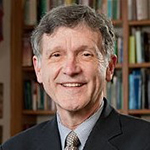 By Bill Leonard
By Bill Leonard
“The parents have a right to say that no teacher paid by their money shall rob their children of faith in God and send them back to their homes skeptical, or infidels, or agnostics, or atheists.” — W.J. Bryan, 1925
“Here, we find today as brazen and as bold an attempt to destroy learning as was ever made in the middle ages, and the only difference is we have not provided that they shall be burned at the stake, but there is time for that, your Honor.” — C. Darrow, 1925
Ninety years ago this summer the infamous Scopes “Monkey” Trial convened in Dayton, Tenn. What many called the “trial of the century” (there would be several in the 1900s) was held inside and outside Judge John Raulston’s steamy courtroom in July 1925.
In March, the Tennessee state legislature had passed the Butler Act stating:
“It shall be unlawful for any teacher in any of the universities, Normals and all other public schools of the State which are supported in whole or in part by the public school funds of the State, to teach any theory that denies the story of the Divine Creation of man as taught in the Bible, and to teach instead that man has descended from the lower order of animals.”
In response, the fledgling American Civil Liberties Union (founded in 1913) sought a Tennessee school teacher who would intentionally violate the law in order to take the question to the courts. Co-director Arthur Garfield Hayes, a prominent New York attorney, agreed to serve on the defense team should such a volunteer be secured. At the same time, various town “fathers” determined that such a nationally-focused trial would “put Dayton on the map.” Meeting at Robinson’s Drug Store, they implored John Scopes, high achool football coach and sometime classroom substitute, to violate the Butler Act thereby bringing the ACLU to Dayton. Scopes confessed that he had taught evolution while subbing in a biology class, was arrested and charged. (He later admitted having skipped most of the evolution chapter in the class text, and had not literally broken the law.)
The prosecution announced that the Great Commoner, William Jennings Bryan, master rhetorician, three-time Democratic presidential candidate and former secretary of state, would join the case. Bryan, a political progressive who favored women’s suffrage, a national income tax and rejection of the gold standard, was a Presbyterian fundamentalist who opposed evolution as false science that would destroy Christian orthodoxy. In court he declared: “If this [evolution] doctrine is true, this logic eliminates everything supernatural, and that means they eliminate the virgin birth … the resurrection of the body … [and] the doctrine of the atonement ….” The Butler Act, Bryan believed, reflected the peoples’ will, and teachers should to conform to the desires of the (Christian) majority.
Tom Stewart, local D.A. and later senator, saw Scopes’ action as a simple misdemeanor to be adjudicated as an example to other would-be-teacher-evolutionists.
Bryan’s old nemesis, the agnostic and equally legendary defense attorney Clarence Darrow, offered himself pro bono to the Scopes’ defense team, asserting that the case was a battle between faith and reason, medievalism and modernity. Darrow insisted that “this is a case of law, and … almost impossible as it is to put my mind back to the sixteenth century, I am going to argue as if it was serious, and as if it was a death struggle between two civilizations.” ACLU lawyers, however, understood it as a plea for academic freedom and the minority rights of teachers to dissent against majoritarian-based laws when conscience dictated.
Judge Raulston refused to allow scientific “experts” to defend evolution as fact not theory, and denied defense requests to remove the “Read your Bible” banner from the courtroom or abandon opening prayers in court. Darrow gained a bit of ground by putting Bryan on the stand as a Bible “expert,” embarrassing him with questions linking science and creation stories. Raulston declared the case closed and when the jury quickly found Scopes guilty, fined him $100. On appeal, the Tennessee Supreme Court upheld Butler but threw out the verdict and fine on a technicality.
Case closed? Of course not! I’m teaching a course on Scopes this weekend, fascinated that the debates continue unabated.
The prevailing “myth” of the Scopes trial suggested that modernity defeated traditionalism, liberalism bested fundamentalism, urban/urbane intellectualism prevailed over rural/southern anti-intellectualism, and science won out over superstition. Others, however, note that after Scopes, fundamentalism morphed into evangelicalism and anti-evolution continued to challenge Darwinian hegemony through Young Earth, Creation Science and Intelligent Design approaches to creation. Ninety years later, questions of law and conscience and of majority/minority rights persist, as real as a jailed magistrate who won’t sign marriage licenses in Rowan County, Ky. (yet another media circus). As L. Maren Wood wrote, the Scopes Trial and its accompanying “myth” seem less “a debate between religion and science but a debate associated with American nationalism and identity.”
As protagonists shift and majorities come and go, many contemporary fundamentalists, stung by the loss of Protestant hegemony, appear to have gained new appreciation for religious liberty. In 1925, who’d have guessed?
